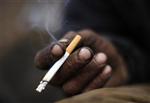 |
 |
 |
||
    |
||||
|
||||

Triple therapy boosts quit rates in sick smokers
|
|
Reuters Health
Monday, April 6, 2009

"Medically ill smokers are often highly addicted and at great risk for complications from continued smoking," study chief Dr. Michael B. Steinberg, of the University of Medicine and Dentistry of New Jersey, Robert Wood Johnson Medical School, said in a prepared statement. "Our trial demonstrates that intensive treatment with a triple combination of medications could work well for them."
The study involved 127 smokers, who expressly wanted to quit, with illnesses such as heart disease, lung disease, cancer, and diabetes. The smokers were randomly assigned to receive a nicotine patch for 10 weeks or a combination of a nicotine patch, a nicotine inhaler, and the antidepressant bupropion for as long as needed.
At about six months, the patients in the combination therapy group had a success rate of approximately 35 percent. By contrast, the nicotine patch group achieved only a 19 percent success rate.
"The simultaneous use of nicotine medications with bupropion addresses tobacco withdrawal through different mechanisms of action," Steinberg's team points out in the Annals of Internal Medicine, while the combination of a patch with an inhaler "to be used in response to cravings allows more individualized delivery of medication as needed."
"Even though persons with medical illnesses smoke at high rates, they are often not prescribed intensive smoking cessation pharmacotherapy because of concern about adverse events," the investigators point out. The current study, they say, is one of only a handful that has looked at interventions for these high-risk patients.
Reuters Health
© 2009 Thomson Reuters. All rights reserved. Reuters content is the intellectual property of Thomson Reuters or its third party content providers. Any copying, republication or redistribution of Reuters content, including by framing or similar means, is expressly prohibited without the prior written consent of Thomson Reuters. Thomson Reuters shall not be liable for any errors or delays in content, or for any actions taken in reliance thereon. "Reuters" and the Reuters Logo are trademarks of Thomson Reuters and its affiliated companies. For additional information on other Reuters media services please visit http://about.reuters.com/media/.
More News on this Date
Related MedlinePlus Pages:
| Home | Health Topics | Drugs & Supplements | Encyclopedia | Dictionary | News | Directories | Other Resources | |
| Disclaimers | Copyright | Privacy | Accessibility | Quality Guidelines U.S. National Library of Medicine, 8600 Rockville Pike, Bethesda, MD 20894 National Institutes of Health | Department of Health & Human Services |
Date last updated: 07 April 2009 |
